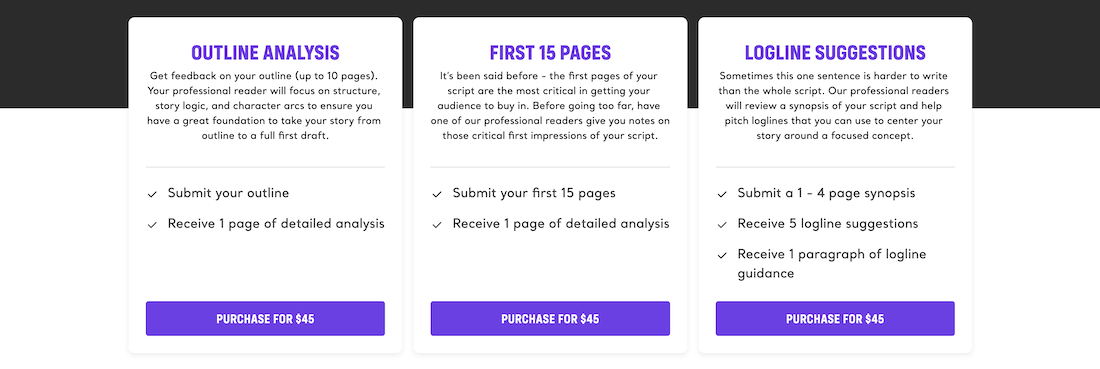How Writing Script Coverage Can Help You Become a Better Screenwriter

There is plenty for screenwriters to learn about the screenwriting trade. You’ll learn all you need to know about format, concept, structure, theme, dialogue, character arcs, story arcs, page counts, pacing, plot, and so many other screenwriting elements through books, courses, tutorials, mentorships, and the good ol' trial and error of just sitting down and writing. But there’s no better screenwriting education than writing script coverage as an industry script reader/story analyst, intern, assistant, or junior development executive.
With that in mind, here we briefly discuss what script coverage is, and delve into the benefits screenwriters can receive by writing script coverage.
What Is Script Coverage?
Script coverage is a comprehensive analysis provided by a script reader for a screenplay or teleplay, used as an essential tool by production companies, studios, streamers, networks, management companies, and agencies to evaluate screenplays.
Coverage typically includes a summary of the script, an analysis of its strengths and weaknesses, and a recommendation on whether it should be considered for acquisition and production.
Coverage reports generally consist of several key components:
- Logline: A brief, compelling summary of the screenplay’s core premise.
- Synopsis: A detailed summary of the plot, often broken down by act.
- Notes: An in-depth analysis covering aspects like structure, character development, dialogue, pacing, and marketability.
- Rating: A final assessment, which includes a rating or recommendation of "Pass," "Consider," or "Recommend."
Read More: Script Coverage, Notes and Feedback: What’s the Difference?
 The Benefits of Writing Script Coverage
The Benefits of Writing Script Coverage
Writing script coverage offers a multitude of benefits that can enhance your skills as a screenwriter. It truly is the best education you can receive as a screenwriter.
Script Coverage Helps to Analyze Your Scripts Differently
Writing script coverage means you’re being asked to break down a screenplay into its fundamental components. You’ll assess the plot structure, character arcs, dialogue, and pacing, among other elements.
This analytical practice sharpens your ability to identify what works and what doesn’t in a screenplay. As you dissect scripts, you become more adept at spotting strengths and weaknesses, which in turn informs your own writing. And that is what most screenwriters lack—the ability to look past the subjective viewpoints of their own work and, instead, look at their scripts through a much more objective lens.
If you want to become a professional screenwriter, you’re going to need to be able to look at your own work with a much more objective perspective. That is how you evolve as a screenwriter. The ability to notice the objective strengths and weaknesses of your own screenplays will help you on your screenwriting journey.
Read More: 5 Things Screenwriters Should Study While Watching Movies
Exposes You to Diverse Styles and Genres
When you’re a script reader—or an intern, assistant, or junior executive tasked with reading scripts and writing coverage you’re going to be reading a lot of screenplays from different genres.
This reading and analyzing of such a wide variety of scripts exposes you to different storytelling techniques, styles, and genres. The position will offer you exposure that broadens your understanding of what makes a screenplay effective across different contexts.
By seeing what succeeds and what fails in various genres, you gain a versatile toolkit that you can apply to your own writing projects.
Pro screenwriters need to be diverse in their abilities. While it’s nice to have a niche strength that can make you a go-to screenwriter for certain projects, most studios, streamers, networks, and production companies want writers who can“play” in many different sandboxes.
 Understanding the Script Market Through Script Coverage
Understanding the Script Market Through Script Coverage
When you write script coverage, you’re usually asked to include an analysis of a screenplay’s marketability.
Factors like target audience, commercial potential, and industry trends need to be shared with development executives and producers. When you do this type of work, you will gain insights into what the market is looking for. This knowledge can help you tailor your own scripts to be more appealing to producers and executives, increasing your chances of success.
In short, it will give you an edge most other screenwriters don’t have.
Enhances Your Storytelling Skills
Writing coverage forces you to think critically about story elements such as plot, theme, and character motivation. You’ll learn to recognize and articulate why certain story choices work while others fall flat.
This critical thinking translates into stronger storytelling skills, as you become more conscious of the narrative choices you make in your own scripts.
Read More: Ronda Rousey Reminds You Why Script Coverage Is a Screenwriter’s Greatest Tool
Script Coverage Improves Your Overall Screenwriting Craft
When you analyze dialogue, scene construction, and pacing in other scripts, you naturally become more attuned to these elements in your own writing.
You can learn so much by observing how other writers handle exposition, conflict, and resolution. You can learn by what they do writers—and by what they do wrong. This helps you refine your techniques and craft more polished and compelling scripts.
 You Learn from What Works and What Doesn’t
You Learn from What Works and What Doesn’t
By far the best learning experience of writing script coverage is the ability to learn from what works and what doesn’t work in the screenplays you analyze.
Generally speaking, about 95% of the scripts you’ll read in your time as a script reader will be an easy pass. 4% will be above average. Maybe 1% will be outstanding. But within each of those percentages, you’ll find things that work and things that don’t.
Even bad scripts may have sequences or concepts that stand out—all of which you can learn from. And, yes, even great scripts have faults that you can learn from as well.
It’s easy to become blind to script issues when you’re only reading your scripts back during your writing and rewriting process. When you start writing script coverage, you’ll quickly begin to have an eye for more objective issues that you can later apply to your own writing.
---
Writing script coverage helps you internalize the elements of successful storytelling, leading to more polished and marketable scripts in your own work.
Script coverage is not just a task—it’s an educational journey that sharpens your craft and broadens your horizons as both a script reader/story analyst and a screenwriter.
If you get a chance, find opportunities to embrace the role of a script reader, dive into the world of screenplay analysis, and watch as your writing skills soar to new heights.
Read More: How to Become a Hollywood Script Reader
Check out our Preparation Notes so you start your story off on the right track!

Ken Miyamoto has worked in the film industry for nearly two decades, most notably as a studio liaison for Sony Studios and then as a script reader and story analyst for Sony Pictures.
He has many studio meetings under his belt as a produced screenwriter, meeting with the likes of Sony, Dreamworks, Universal, Disney, Warner Brothers, as well as many production and management companies. He has had a previous development deal with Lionsgate, as well as multiple writing assignments, including the produced miniseries Blackout, starring Anne Heche, Sean Patrick Flanery, Billy Zane, James Brolin, Haylie Duff, Brian Bloom, Eric La Salle, and Bruce Boxleitner, the feature thriller Hunter’s Creed, and many Lifetime thrillers. Follow Ken on Twitter @KenMoviesand Instagram @KenMovies76.
Tags
Get Our Screenwriting Newsletter!
Get weekly writing inspiration delivered to your inbox - including industry news, popular articles, and more!


 The Benefits of Writing Script Coverage
The Benefits of Writing Script Coverage Understanding the Script Market Through Script Coverage
Understanding the Script Market Through Script Coverage You Learn from What Works and What Doesn’t
You Learn from What Works and What Doesn’t

























